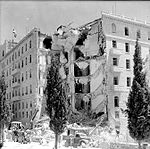Herod's family tomb
2007 archaeological discoveriesAncient history of JerusalemAncient sites in JerusalemArchaeological sites in JerusalemArchaeological sites in the West Bank ... and 18 more
Architectural historyBuildings and structures completed in the 1st century BCBuildings and structures in JerusalemBurial monuments and structuresCemeteries in JerusalemClassical sites in JerusalemEstablishments in the Herodian kingdomHellenistic architectureHerod the GreatHerodian dynastyHistoric sites in JerusalemJewish cemeteries in IsraelJewish mausoleumsJews and Judaism in the Roman EmpireJudaean DesertRock-cut tombsTombs in IsraelTombs in the State of Palestine

Herod's family tomb, with or without upper-case initials, can refer to several sites identified at different times as the burial structures of the immediate relatives of Herod the Great, one of them probably being the famed king's own tomb.
Excerpt from the Wikipedia article Herod's family tomb (License: CC BY-SA 3.0, Authors, Images).Herod's family tomb
Pele Yoetz, Jerusalem Yemin Moshe
Geographical coordinates (GPS) Address Nearby Places Show on map
Geographical coordinates (GPS)
| Latitude | Longitude |
|---|---|
| N 31.774 ° | E 35.224055555556 ° |
Address
פלא יועץ
Pele Yoetz
9410158 Jerusalem, Yemin Moshe
Jerusalem District, Israel
Open on Google Maps










